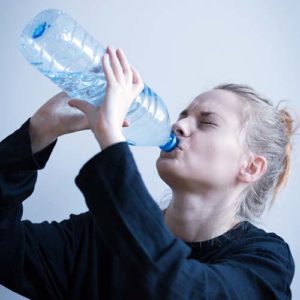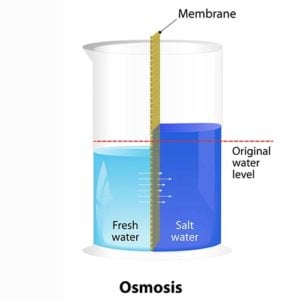Of all the silly urban legends …
In any event, the whole thing is a 
In fact, excessive water drinking is potentially hazardous. To understand why, we must review the principle of osmosis from high school biology while staying awake. Imagine you’re the owner of a fancy Belltown nightclub. You show up one Saturday night when there is a convention of flashy, out-of-towners in Seattle, and 10% of your club is now populated by big guys in fancy sport coats. You demand to know why your bouncers let them in. The bouncers say the out-of-towners are rich and buy lots of liquor. As long as 90% of the patrons are your local customers, having 10% big spenders makes a good balance.
Maybe you’re happy with that, so you instruct the bouncers not to let any of the big spenders out, but for cryin’ out loud, don’t let any more in! You want your loyal customers to come and go as they please. You’ve now created a semi-permeable membrane, a barrier that lets some smaller molecules pass but holds up the bigger molecules. In the human body, water can freely pass in and out of cells, but sodium and other larger molecules are restricted in their movements.
If a crowd shows up outside the club with the same mix of 10% big spending out-of-towners and 90% loyal customers, as the loyal folks come and go, the percentages inside the club will not change. But if 100% of the people showing up are loyal customers, then by their random coming and going, more people will end up inside the club. The out-of-towners are stuck in there, held in place by the bouncers who want them to spend, and when additional loyal customers arrive, the club will swell up. If there are 50% out-of-towners and 50% loyal customers outside the club, then there will be a net migration of loyal customers out and the club will shrink down. This is osmosis.
The same principle can be observed when you stay in the bath too long. Some plain water from the bath is absorbed by the fingertips and the skin swells up. In order for the now swollen skin to fit in the same space, it has to wrinkle.

Before the mid-1980s, athletes only drank water when they were thirsty, and medical problems from excessive water drinking during athletics were extremely rare. Then folks started on this psychotic water bandwagon. During marathons, there were water stations every ten feet and everyone was warned not to get “dehydrated.” As a result of this unwarranted fear, athletes suffered from hyponatremia because they drank too much water during exercise. One runner died in the Boston Marathon as a result of drinking water excessively.
You might think that all you have to do is drink salty water to prevent this problem. Unfortunately, drinking electrolyte-rich “sport drinks” will not work because they have a far lower salt concentration than the normal human body. The saltiness would have to be equal to that of tears, and not only is that too much salt for us to tolerate in big gulps, but our bodies are not designed to drink down huge quantities of salt water.
When you are exercising, your normal instinct, without reading silly urban legends in health magazines, is to drink some water, but not enough to fully replace what you lose, and that is exactly what the body wants to do. This would be on page five of the human owner’s manual if we had one. People naturally eat and drink in the ensuing hours following a long period of exercise, and this helps slow any shifts in sodium concentration. It also gives the kidneys a chance to make whatever adjustments are necessary. It is perfectly acceptable to become mildly “dehydrated” during a marathon. In fact, winners of marathons tend to be somewhat dehydrated at the end of the race, just as nature intended. It is not reasonable, healthy, or possible to fully replace everything you lose with exercise. You are supposed to replace most of it later. This is what people have been doing since the dawn of time. Dehydration, with a normal or near normal sodium level is much, much safer than developing hyponatremia.
If you are a vigorous exerciser and can’t break yourself of the habit of drinking beyond your body’s sense of thirst, then check your weight at the beginning of a race and make sure it never goes up during exercise. Gaining weight is proof you are becoming overhydrated and developing hyponatremia, unless you are eating hamburgers during your workout.
If it is way too hot or humid outside and you exercise vigorously,
no amount of fluid consumption will
really prevent heat stroke.
We should also distinguish heat stroke from dehydration. Heat stroke means the body is too hot and could not cool itself adequately. Sure, if you’re so dehydrated that you no longer sweat, your body temperature will rise, but this is unlikely to occur under virtually any reasonable exercise condition. Sweating is just one of many mechanisms we have to cool the body. If it is way too hot or humid outside and you exercise vigorously, no amount of fluid consumption will really prevent heat stroke. Don’t think you can drink your way out of that problem. The only way to drink and prevent heat stroke if you’re planning on running a marathon on an extremely hot, humid day is to skip the race and hang out at the bar.
In any event, if you are running that marathon, your own body has thirst sensors which work quite well and will encourage you to replace some, but not all, of your body water losses. If you develop heat stroke, it is mostly because you could not get rid of the excess heat, not because you became seriously dehydrated.
What are those rare scenarios where extra water consumption might be of help? If you are in a developing country with no access to medical care, and ill with severe diarrhea, then drinking beyond normal thirst may be beneficial in the short term. This is called oral rehydration and should not apply to most of us. If you have kidney stones, then a modest increase in water consumption might reduce, but not eliminate, the risk of recurrent stones. Here, we’re talking about two to three 8 oz glasses of water daily, not a huge increase.
In conclusion, there are essentially no health benefits to drinking liquids beyond what normal thirst dictates. In certain conditions, it can be hazardous to do so. There is no hard and fast rule about eight glasses of water per day. That is just made-up nonsense. Mild dehydration during exercise is normal and safe. Folks should simply rely on their thirst instincts and drink water only when thirsty.

